Policy Instruments for the Environment Database
About PINE
The database
“Policy Instruments for the Environment” (PINE) is a unique database gathering detailed information on policy instruments relevant for environmental protection and natural resource management.
Work to build the database started in 1996, initially with a limited scope, and it was progressively expanded. Today, the database contains information on over 3900 policy instruments implemented in more than 130 countries globally.
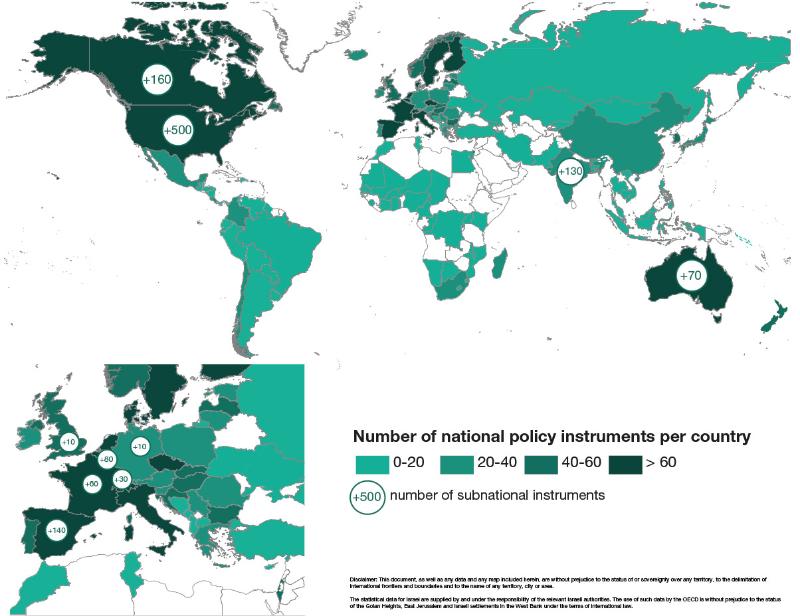 |
| Click to enlarge |
Instruments by type and environmental domain
PINE is a structured and harmonised database suitable for statistical analysis. It provides the same set of quantitative and qualitative information for each instrument. Its relational structure is designed to support empirical policy analysis.
The database covers five types of policy instruments across 22 environmental domains.
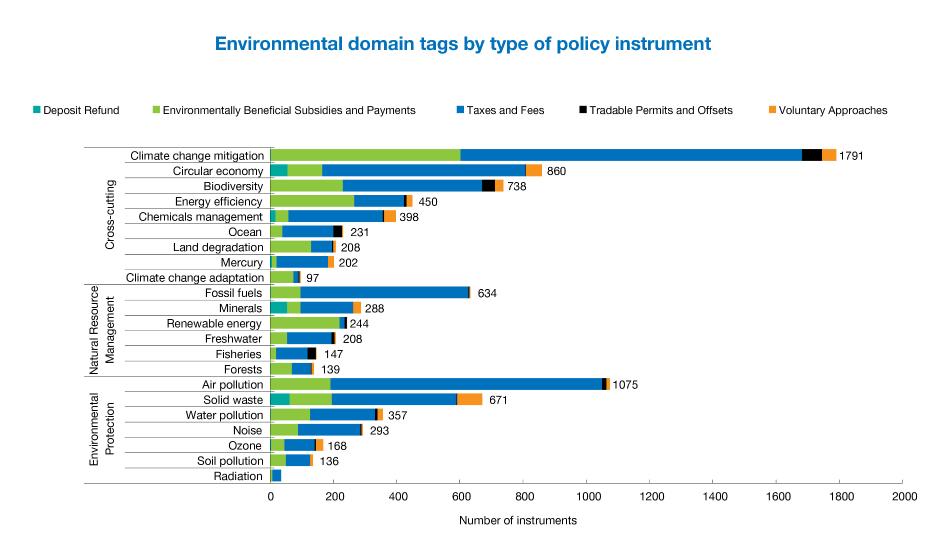
Key information in one place
PINE gathers essential descriptive information in one place. For each instrument, you can find:
- when it was introduced;
- what it applies to;
- the geographical coverage;
- the environmental domains it aims to address;
- the industries concerned;
- revenues, costs or rates;
- exemptions.
Harmonised official information
The information in the PINE database is collected via a network of 400 country experts (including government agencies, research institutes and international organisations).
Registered experts update the data once per year through our password-protected interface.
The OECD Secretariat then harmonises and validates the data, in consultation with countries, before they are published.
In-depth coverage
Environmentally related tax revenue
Environmentally related taxes represent about a half of all instruments in the database. The tax bases covered include:
- Energy products (including vehicle fuels)
- Motor vehicles and transport services
- Measured or estimated pollution emissions to air and water, ozone depleting substances, certain non-point sources of water pollution, waste management and noise
- Management of resources: water, land, soil, forests, biodiversity, wildlife, and fish stocks.
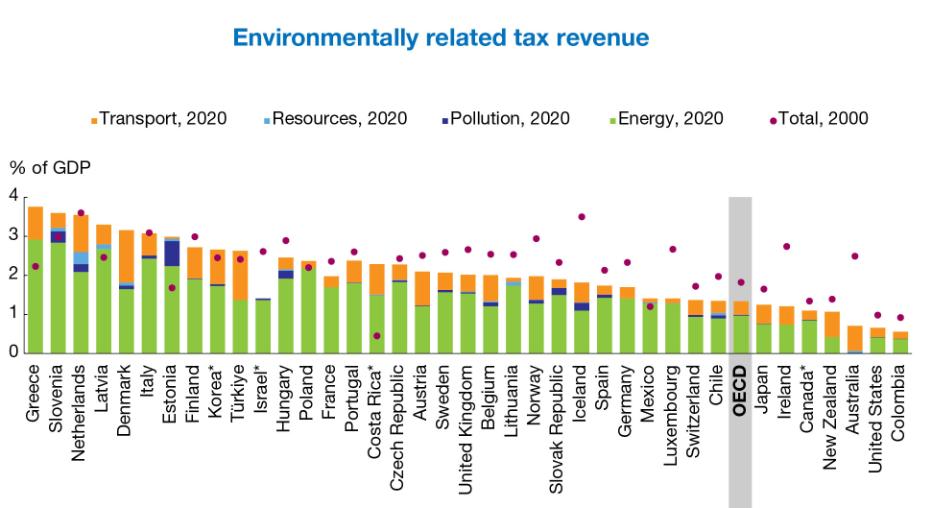
Note: *indicates that environmentally related tax revenue is displayed for the last available year: Australia 2017, Canada 2014, Costa Rica 2019, Israel 2018, Korea 2014.
- Visit for more detailed information on environmentally related taxes.
- Extract the summary statistics from the OECD statistical portal.
Tracking biodiversity-relevant policy instruments
Since 2016, the PINE database identifies and tracks economic instruments relevant for biodiversity. These indicators also serve the Biodiversity Indicators Partnership and serve for tracking SDG 15.a.1, on revenue generated and finance mobilized from biodiversity-relevant economic instruments. The data and indicators were also used to monitor progress towards Aichi Target 3 of the 2011-2020 Strategic Framework for Biodiversity under the U.N. Convention on Biological Diversity. Today, these indicators are relevant to the Kunming-Montreal Global Biodiversity Framework (KMGBF), specifically Target 18 on Incentives and Target 19 on Resource Mobilisation.
In 2022, the data collection of PINE was expanded to cover key characteristics of biodiversity-relevant instruments, including on payments for ecosystem services (PES) and biodiversity offsets.
Access the data
Summary statistics
- Consult environmental indicators on Environment at a Glance
- Our webpage on environmentally related taxation shows key data on tax revenue by country.
- Find more detailed data at the OECD statistical portal.
Policy microdata
Visit the PINE data visualization portal and browse the policy microdata. Pre-defined queries will allow you to search and extract data by type of instrument, country, environmental domain, or by industry.
Contribute
All countries are welcome to contribute to the database. Government ministries or agencies, and recognised research institutes, are welcome to join the network of PINE country experts.
Policy instruments implemented by all branches of government can be integrated into PINE insofar they are of environmental relevance.
Join the network of country experts by writing to pinedatabase@oecd.org.
Send us your feedback
Write to us
- Write to pinedatabase@oecd.org.
Related work
Environment at a Glance - OECD Indicators
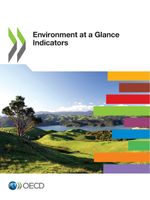 |
Environment at a Glance sheds light on the progress made by OECD countries in addressing climate change, air and water pollution, the management of waste and natural resources and the protection of biodiversity. It examines major trends in sectors such as energy, transport and agriculture and reviews developments in environmentally related taxation, official development assistance and research and development budgets. These indicators are regularly used in OECD work to track environmental progress and inform policy analysis and country reviews. |
Green Growth Indicators 2017
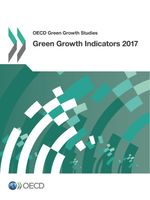 |
This report updates and extends the set of green growth indicators presented in the 2014 and 2011 editions. It charts the progress that OECD countries and G20 economies have made since 1990. The 2017 edition places greater emphasis on the role of policy action, with enriched discussion on environmentally related taxes and subsidies, technology and innovation, and international financial flows. |
Environmental Performance Reviews
 |
The OECD Environmental Performance Reviews provide independent assessments of countries’ progress towards their environmental policy objectives. Reviews promote peer learning, enhance government accountability, and provide targeted recommendations aimed at improving environmental performance, individually and collectively. They are supported by a broad range of economic and environmental data, and evidence-based analysis. Each cycle of Environmental Performance Reviews covers all OECD countries and selected partner economies. |
Economic Surveys
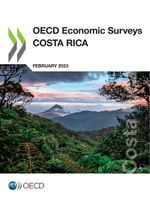 |
OECD Economic Surveys are periodic reviews of member and non-member economies. Reviews of member and some non-member economies are on a two-year cycle; other selected non-member economies are also reviewed from time to time. Each Economic Survey provides a comprehensive analysis of economic developments, with chapters covering key economic challenges and policy recommendations addressing these challenges. Read the latest economic survey. |
Subscribe to the newsletter
The OECD regularly publishes newsletters featuring the latest publications, analysis, events, Green Talks LIVE webinars, articles and blogs related to environment, chemical safety and biosafety and green growth and sustainable development. Sign up for our newsletters on:
» Environment;